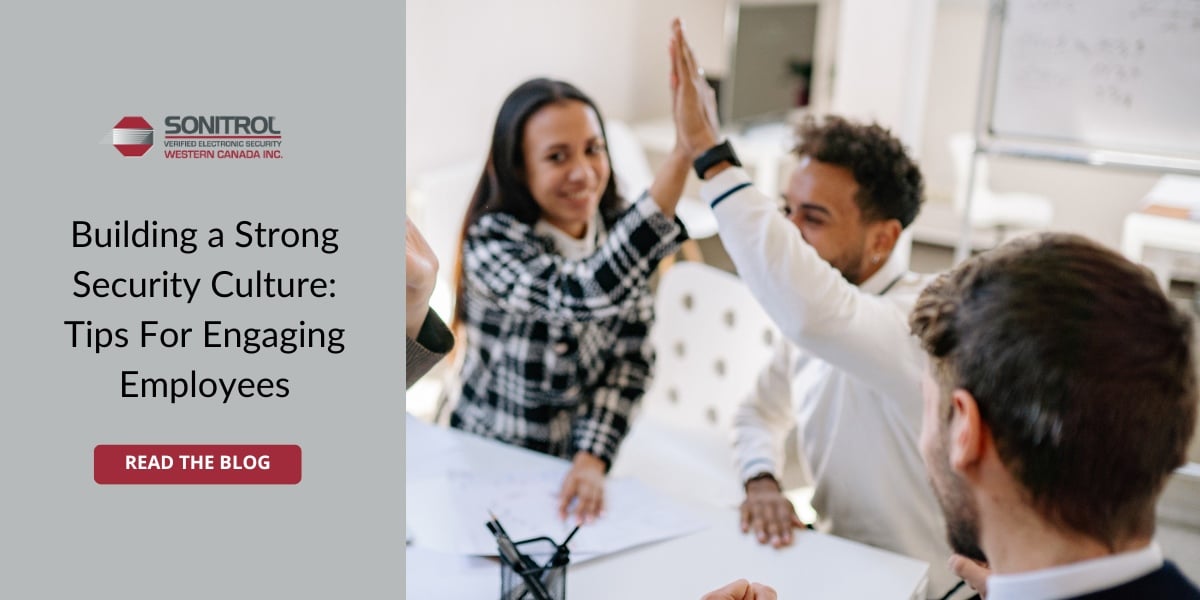Building a Strong Security Culture: Tips For Engaging Employees
 The world is rapidly evolving. While this has produced some amazing innovations, it has also given criminals more creative ways to exploit their victims. As a result, organizations face an unprecedented number of security threats.
The world is rapidly evolving. While this has produced some amazing innovations, it has also given criminals more creative ways to exploit their victims. As a result, organizations face an unprecedented number of security threats.
While investing in robust security systems and cutting-edge technologies is crucial, it is equally important to foster a strong security culture within your organization. Building a security-conscious workforce is a vital defense against both cyberattacks and physical security breaches.
Engaging employees in security practices not only protects sensitive information but also reinforces a sense of responsibility and ownership throughout your business.
Here are some key tips to help your organization build a strong security culture and engage your employees:
1. Education and Awareness
Knowledge is power when it comes to security. Conduct regular training sessions to educate employees about various security threats to your business, best practices to avoid them, and the potential consequences of security breaches. Engage them through interactive workshops, quizzes, and real-life examples to make the training sessions more relatable and impactful.
By raising awareness, employees become more vigilant and proactive in identifying and reporting potential security risks.
2. Clear Policies and Procedures
Establishing clear security policies and procedures is essential for creating a strong security culture. Develop comprehensive guidelines that outline acceptable use of technology, password management, data handling protocols, and physical security measures. Ensure these policies are easily accessible and regularly communicated to all employees.
You also want to encourage employees to ask questions and provide feedback to foster a collaborative environment.
3. Lead by Example
Building a strong security culture starts at the top. Implementing security protocols consistently throughout the organization sends a strong message that security is a shared responsibility.
When employees see their leaders taking security seriously, they’re more likely to follow suit. That’s why leadership must prioritize security and demonstrate a commitment to best practices.
4. Encourage Reporting
Create a culture that encourages employees to report any security concerns promptly. This can be achieved by establishing multiple channels for reporting, such as anonymous hotlines or dedicated email addresses. This will help make sure employees feel comfortable sharing potential risks or suspicious activities.
Implementing a "no blame" reporting policy is also an important step. This emphasizes the importance of early detection and prevention, fostering a proactive security culture.
5. Recognition and Incentives
Recognize and reward employees who demonstrate exemplary security practices. This can be through public acknowledgment, awards, or small incentives.
By celebrating employees who prioritize security, organizations reinforce the desired behaviors and encourage others to follow suit. This recognition not only boosts morale but also reinforces the importance of security as an integral part of the organizational culture.
6. Ongoing Communication
Security is never a one and done situation. You can’t simply sit everyone down for a refresher once a year and hope they take their security responsibilities seriously. Consistent and ongoing communication is vital for maintaining a strong security culture.
Use various channels such as internal newsletters, intranets, and regular security updates to keep employees informed about the latest security threats, industry trends, and organizational security initiatives.
Reinforce key messages and provide relevant examples to help employees understand the direct impact of their actions on the overall security posture.
7. Testing and Simulations
Do you remember running emergency drills in school? It wasn’t anybody's favourite activity, but it did ensure that everybody knew what to do in a bad situation. While you don’t need to get your adult staff to line up and do roll calls at the designated meeting point (though it couldn’t hurt), you do want to run regular tests.
Regularly conduct physical security assessments, penetration testing, and simulated phishing campaigns to evaluate the effectiveness of your security culture. These exercises help identify vulnerabilities, measure employee awareness, and provide targeted training opportunities.
By incorporating lessons learned from these simulations into your security plan and training, organizations can continuously improve their security practices.
The Importance of a String Security Culture
Security is a collective effort, and every employee plays a crucial role in maintaining a secure environment. By building a strong security culture, organizations can stay one step ahead of potential threats and protect their valuable assets effectively.
But remember … building a strong security culture is an ongoing process that requires commitment, collaboration, and continuous improvement. By engaging employees through education, clear policies, and leading by example, organizations can create a workforce that is actively invested in safeguarding their workplace.
A robust security culture not only protects against external threats but also instills a sense of pride and responsibility within the organization, strengthening its overall security posture.
Need help enhancing your company’s physical security? Learn more about how Sonitrol’s innovative verified alarm solutions can protect your premises from theft and other damaging crimes. Contact us today for your free commercial security plan.
June 06, 2023





.svg)
